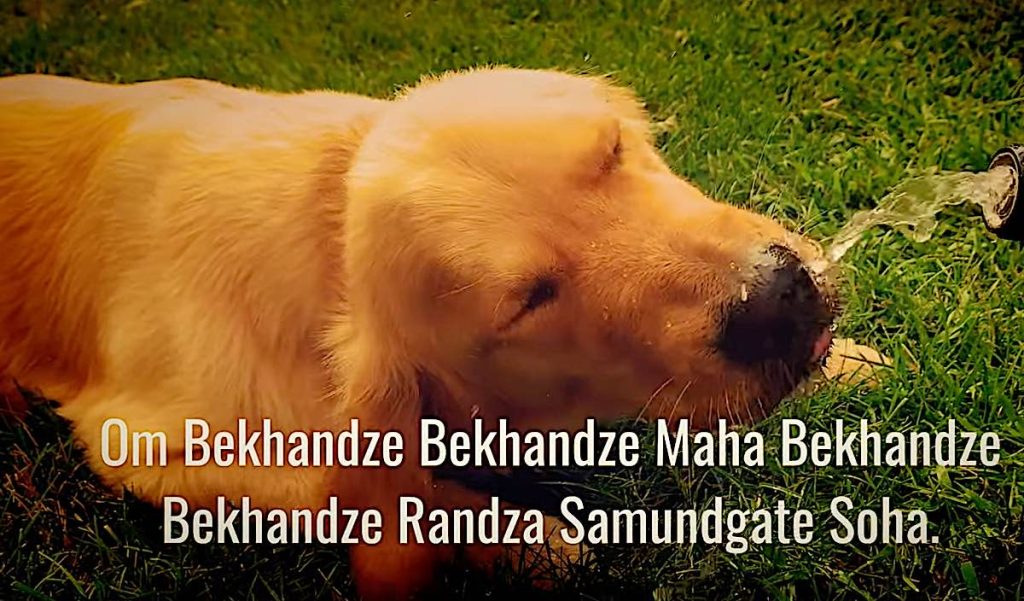With insights from Lama Zopa Rinpoche, Venerable Zasep Rinpoche and Venerable Thubten Choden. Ends with Healing Medicine Buddha Mantras (Recommended by teachers to play for your animal companions!) chanted by the amazing Yoko Dharma with beautiful animal videos. (Video embedded below!)
Partial Transcript
Many Mahayana meditations, sadhanas and prayers use language such as “all beings have been our mothers…” — a constant reminder that every being, even the insect we step on by accident, is our family. Ultimately, Mahayana Buddhists accept that humans and animals are interconnected as a single family — in the Oneness of the Universe.
Clearly, your doggie, kitty, hamster, budgie and extended animal companions all have both Buddha Nature and karma. In what ways does this change our relationship to our beloved companions?
Lama Zopa Rinpoche, in a teaching on “animals in everyday life” said,
“There is a story when Buddha gave teachings to 500 swans in the field and the next life they were born as human beings, became monks, and they all became Arya beings, able to achieve the cessation of suffering and the true path. So the result is unbelievable, just by hearing Dharma words.”
This teaching illustrates that all animals have Buddha Nature. The swans, in just one life cycle, became humans, monks, and ultimately Aryas.
Dog enjoys water and Medicine Buddha Mantra: Om Bekhandze Bekhandze Maha Bekhandze Bekhandze Randza Sumundate Soha.
Most Buddhists are familiar with these stories. Yet, in real life, do we really treat our animal companions as fellow journeyers on the path to Enlightenment? If we did, we’d bring our pets meditation rooms and retreats. We’d acknowledge our companions are subject to Karma, just like us.
This means that, as their friends, we need to be mindful of their actions, as much as our own, because they, too, have Buddha Nature. They, like the swans, can become Aryas (Enlightened Beings). When your doggy chases and kills a squirrel, you have to help him mitigate his unfortunate karma. When you kitty kills a blue jay, you have to take a measure of responsibility.
Kitties like Medicine Buddha Mantra too!
Mantras for Companion Animals
Venerable Zasep Rinpoche, Spiritual Director of Gaden for the West, believes its important to practice with your animal companions and chant mantras for them.
Zasep Rinpoche (on screen):
“In all those years he was with me, more or less, whenever we meditate, whenever we did prayers, he’d come and sit next to us. He’d walk around between the people and look at people. And when we’d say mantras he’d come down, and I felt he received so many blessings, from the mantras and prayers.”
Doggy at a Buddhist temple with a Mani Prayer Wheel.
At the Tibetan Buddhist Centre in Redding, they arrange events where they “recite mantras and pray for the animals.”
As they chant mantras and prayers, they plant “a kind of seed that grows in the minds of animals to give them good health and a better life.”
This example is meant to be a daily practice for Dharma companions of animals — reciting mantras every day.
This example is meant to be a daily practice for Dharma companions of animals — reciting mantras every day.
Animals are like humans with emotions.
Animals can be sad, afraid, worried, wish to be happy…
As they chant mantras and prayers, they plant “a kind of seed that grows in the minds of animals to give them good health and a better life.”
Medicine Buddha for Animals
Medicine Buddha is well known as a practice for animals. It is taught that Medicine Buddha’s mantra when spoken in a dying animal’s ear, will help release it from lower rebirth, ensuring birth as a human.
Kyabje Lama Zopa Rinpoche also advises these mantras or practices as beneficial for animals, throughout their lives to help bless their mind streams:
Medicine Buddha’s mantra:
Om Bekhandze Bekhandze Maha Bekhandze Bekhandze Randza Samundgate Soha
Lama Zopa also recommends including your animal companion in your practices.
He wrote, in advice to a student,. “Take them around holy objects — circumambulate… Chant mantras…” Recite prayers in their ears to “plant the seed of all the realizations of the path to enlightenment.”
“This makes a huge difference. It has an inconceivable results, unbelievable result. That makes them have a good rebirth in the next life, to be born as a human being and meet the Dharma.” He also recommends blessing their food by chanting mantras and blowing on their food and water.
Venerable Chodron also advised: “So read Dharma books or short texts or prayers out loud to your companion, for example, the Heart Sutra, The Three Principle Aspects of the Path, The Foundation of All Good Qualities, and so on. Say lots of mantras so he hears it.” She was speaking to a student who’s pet was dying, but the advice is best applied much earlier, long before sickness and end of life issues.
Daily Meditation: include an animal companion
Many Buddhists encourage their pets to settle down in a room where they meditate or perform daily sadhanas. Cats, in particular, seem drawn to practice, often snuggling right in the lap of the meditator. Of course, highly precise, advanced tantric practices might not be the best for pets, but for simpler practices — quiet breathing practice, mantra practice or sutra reading — the company is very beneficial.
Snuggle up to your animal companion, now, and listen to the wonderful voice of Yoko Dharma chanting the Medicine Buddha mantra, recommended by many Mahayana teachers as beneficial for all beings, including your non-human companions.
Snuggle up to your animal companion, now, and listen to the wonderful voice of Yoko Dharma chanting the Medicine Buddha mantra, recommended by many Mahayana teachers as beneficial for all beings, including your non-human companions.

